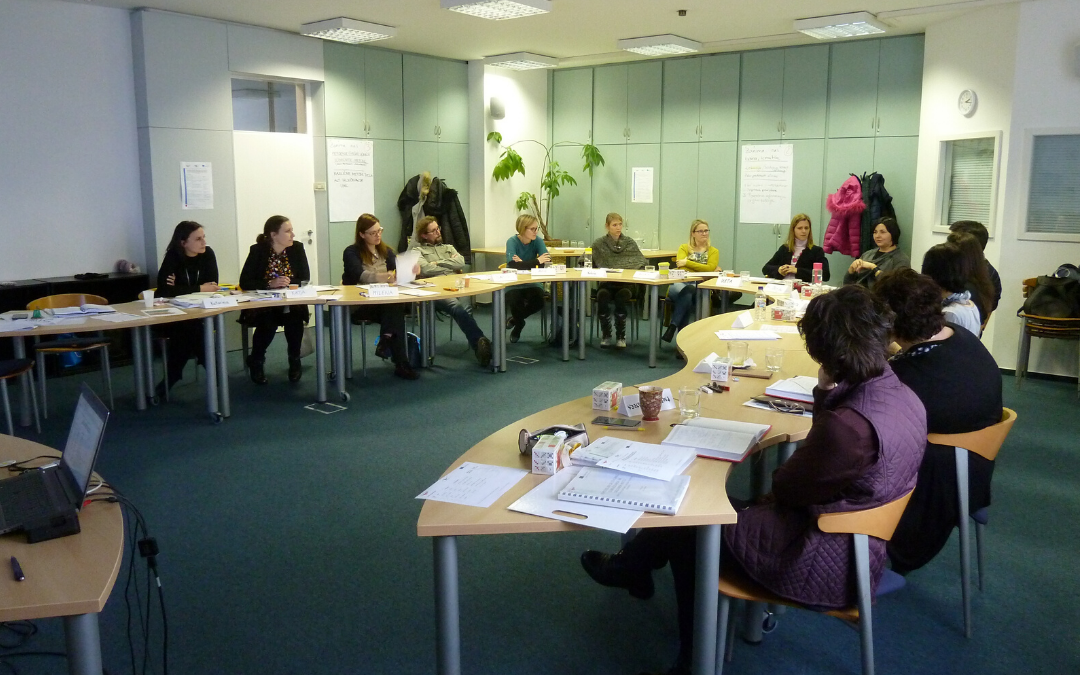The Profi-Train international project focuses on professionalization and professional development of trainers who prepare and carry out educational programmes to develop basic skills of low educated employees. At the end of last year, the SIAE prepared a 3-day training programme titled Competent to train Work Based Basic Skills. Training was carried out partly as a residential training programme. It was attended by 15 adult educators who prepare and implement programmes for employees. Training attracted professionals already involved in the training of employees as a part of two national projects, the Acquisition of Basic and Vocational Competences 2018–2022 and Munera 3 2018–2022 (dealing with the further professional training for employees).
The pilot training addressed the very essential needs of adult educators in Slovenia working in the two respective national projects. The focus was on the new roles of trainers entering work environments, preparing and implementing educational programmes for employees in a work setting, addressing the needs and expectations of companies and development of tailor-made training offer. Very central questions of the training were also how to address and motivate low skilled employees to take part in the training. Last but not least element of the training was how to monitor short-term and long-term benefits of the training from the point of view of different parties, the companies, employees and training organizations.
Through the programme, the participants listened to several examples of good practices of organisations and companies providing training as part of the national project Acquisition of Basic and Vocational Competences 2018–2022. The invited representatives of educational organisations and participating companies confirmed that there are already rich experiences in Slovenia in this area. They gave an account of the particular aspects of implementing work-based training, such as entering companies, analysing training needs, developing and adapting educational services to the needs of the company, employee motivation, monitoring of short- and long-term effects of education, etc. Part of the training focused on the practical aspects of work-based learning, the participation of consultants and other educators in assessing educational needs, preparing and delivering training in the work environment. One of the invited guest speakers was the representative of the Counselling Office for Workers Goran Lukič. From a completely different angle, he revealed that the opportunities and rights to education of less-educated employees are most often breached, frequently in companies that are not organised into chambers and employ a higher number of migrants. He stressed that the need for education to strengthen basic skills is the greatest in this particular group of employees.
The novelty and central focus of the training was the proffesional development of adult educators, who faced the key professional dilemmas of their work during the course of the programme. In doing so, they gained insight into the new needs for professional growth and identified their personal mission and work programme as adult educators who enter and are active in companies in various roles. This process was made possible as we introduced a one-month break in the training programme to set up a small experiment and test the newly acquired knowledge in practice. In conclusion of the training the participants were invited to give a brief reflection, of the process and the lessons learned, while testing the newly acquired knowledge in practice, and as innovative as possible present their personal work programme. The training indeed stimulated them to rethink and present the orientations for their further work and professional development. Their responses were positive, as they had developed a new vision of the work they perform as educators in the work environment. They felt a change in the awareness about their professional development. They gained a wealth of new knowledge, were given specific advice, and learned about flexible approaches that will benefit them when working with companies and organisations and delivering employee training.
Estera Možina, MSc (ester.mozina@acs.si), SIAE


